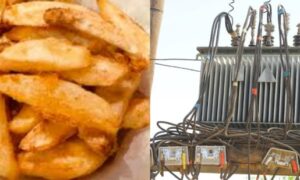CHAPTER 3
I boarded a matatu to Githurai and carried my bag to the Mathare slums. But not before my uncle demanded an explanation as to where I was headed.
My ever-concerned uncle called my dad and informed him that he was releasing me to go and stay with a friend at a place near town.
At first, my dad resisted my decision, but upon hearing my determination, he asked my uncle to release me since I could take care of myself.
That said, he gave me the fare to town plus KSh 1,000 and asked me to call him if I needed any help. I thanked him profusely and left.
Uncle himself had faced a lot of challenges in life, which made him very understanding and empathetic.
He had been in and out of employment several times before he finally decided to venture into business wholeheartedly, a decision that seemed to have paid off.
After a year in business, my uncle became a millionaire from selling secondhand clothes. He wished me well in my endeavours.
As I sat in the matatu heading to town, I experienced hot flashes, an itchy feeling on the palms and soles of my feet, lightheadedness, and an immense body weakness.
I felt like my world was slowly but surely folding. It was as if I was going to die the next minute. But this is how some of my mornings were. Painful. But these symptoms would improve as the day progressed.
I didn’t even realize it when we got to Ronald Ngala Street, which was also the final destination of the matatu.
I alighted and quickly took a matatu to Mathare. I would later learn of a shortcut, but being reasonably new in the city, I did not want to take chances.
I found Chacha eating his breakfast.
He demanded that I join him, but I declined as I had developed an unexplainable dislike for tea and coffee. I hadn’t touched the two beverages for over a year.
“I’ve told Omosh about your desire to accompany us to the reap,” Chacha began.
“Ehe,” I said, urging him to continue.
“He is very delighted. “He thinks you can be an asset to the squad,” said Chacha.
“How does he know?” I asked.
“He says you look versatile and useful, like a delocalized electron,” said Chacha, almost smiling.
“You say a delocalized electron?” “Stop using that term when you know very well you flopped in chemistry,” I countered.
Now here was Omosh who already thought I would not pee in my pants in case I was caught up in a shootout with police.
“Now when is the reap?” I posed, my words almost chocking me.
“he! he! he!”” Chacha responded in kind.
“Stop displaying your cowardice,” he added.
“I’m not scared.” I said, but Chacha quickly cut in.
“Great. We have a few days left to join the millionaires’ club,” he said.
“We could as well get dispatched to hell, you know,” I mused.
“No problem. That would be an occupational hazard,” said Chacha.
Then he spat the memorable rhyme of one of the pioneering rap groups in Kenya known as K-Shaka:
“Nikifa kwa hii kazi/ mpatie mamangu hii ganji”
(If I die on the job, please pass my share on to my dear mother.)
He further told me that Omosh had made him understand that “you just don’t wake up one day and decide to go reap where you never planted, like a madman!” Thorough planning was indispensable.
That said, we headed to town with Chacha. It was what Nairobi’s ghetto-bred youth referred to as “raundi mwenda” (an aimless walk).
Roaming the streets of Nairobi on a Friday afternoon can prove torturous for broke young men whose loins are on fire.
Curvaceous girls of all shades colonize the streets with their confidence.
The bold ones don tights that outline their figures. Some partially expose their thighs, which resemble the work of a brilliant artist.
On Tom Mboya Street and Moi Avenue, I saw a number of men collide with other passers-by as they craned their necks to catch a glimpse of the beauties.
Even more disturbing was the fact that the majority of the young women befriended older men, popularly known as “Wababa”, because the young men couldn’t afford their material show-offs.
A typical Nairobi slay queen is more preoccupied with show off and glitz—the immediate perks of a romantic involvement with a sponsor.
As a result, her love is usually sold to the highest bidder, who is usually an older man who can afford her extravagant tastes, which include expensive hotel dates and lavish gifts.
But such young women have side boyfriends who ensure they are satisfied where it matters the most.
The traffic lights on Moi Avenue near The National Archives turned green, and the vehicles started moving.
But the human traffic meant most of the vehicles moved slowly. But just then, I caught sight of something.
In one of the cars, a Honda Civic, was the gorgeous Shillah.
She caught a glimpse of me and smiled contemptuously. She was in the driver’s seat, looking as neat as ever.
I tried to smile back, but a smirk came out instead. In a moment, Chacha and the whole chaos of the human throng ceased to exist, and there I was staring into her eyes, the beauty herself.
To say I was transfixed to the spot is an understatement.
I could see she was also struggling to stop the vehicle from moving.
It was the ominous hooting of motorists and the calls of Chacha that brought me out of the trance-like state.
The Honda Civic revved off, leaving me with so many unanswered questions.
I literally commandeered Chacha to slab benches adjacent to the Kencom Center, where people battling tiredness and the rigors of job-searching in the concrete jungle came to relax.
“Now you were nearly crushed because of your stupid infatuation. “What did that woman give you that makes you appear silly whenever you bump into her?” Chacha posed as soon as we got to the slab.
“So, Mr. Eagle-Eyed, you saw her?” I asked, feigning perplexity.
Chacha knew about my indisputable love for Shillah. But one thing that tripped him was how I was willing to journey to the moon and back just to be with her.
For Shillah, I’d started a business selling bajia and other snacks to other students on campus.
Needless to say, Shillah and I would spend the profits later in the evening in one of the high-end restaurants, where few students could afford to venture.
But on the contrary, there was a question that I never had a full answer to. Did Shillah love me as much as I did?
This question plagued my mind, and the more I tried to find the answers, the more lost and disturbed I felt.
I recalled an incident where, shortly after graduation, I had fallen ill and was diagnosed with mild sepsis.
I had called Shillah to tell her of my condition but was taken aback when she sarcastically replied that “the news of my condition had made her choke on her drink.”
This incident made me wonder if she was truly someone I could rely on in good and bad times, as I envisioned in the ideal scenario.
The second incident was when she openly confessed that, as a strong woman, she wanted a strong man who could take care of himself and her without expecting anything in return.
Even though I was angered by this statement, which reeked of nothing but selfishness, the picture of Shillah resting in my arms seemed to override any doubts about a great future with her.
I stared at my peeling shoes and faded black trousers. I reminisced about my deteriorating health and wondered if there were any chances of me ever spending my lifetime together with the paragon of beauty that was Shillah.
“Any chances?” I asked myself. “But hope springs eternal in the human breast,” I muttered to myself.
My impassioned line of thought was interrupted by commotion just a few yards from where we sat.
A woman had sprung to her feet, chasing after a young man who had snatched her handbag.
Chacha and other people resting on the chairs had broken into a run after the thief.
I had a radiating pain in my ribs, and my attempt to break into a run had resulted in a slight limp.
Barely a hundred metres away lay the thief, who was surrounded by a mob that had formed a ring around him.
“Why did you steal from this woman?” One of the men posed a question to the young man lying on the concrete slabs.
The young man looked shaken. He mumbled something to the effect that he was hungry.
“Hungry? Most of the people you see here are hungry. “But they are not stealing from anyone,” barked the man as he unleashed his Nyahunyo on the young man.
In a split second, kicks, blows, and whips rained on the young man from every angle. Blood oozed from his nostrils and from his left ear.
Luckily, the man with the whip noticed that death was staring at the young man, thereby raising his whip in such a manner that forced the crowd to step back, which in turn made way for the thief to escape.
A section of the crowd was disappointed as their nefarious plot to decimate the young man had been nipped in the bud.
“You must have been very discouraged by today’s turn of events.” “Wasn’t it your desire to send the young man to his maker?” I had asked Chacha as we walked away from the crowd that was still discussing the deteriorating security situation in the city.
“I despise thieves,” Chacha said.
“But don’t you think we are a pretentious lot?” Politicians in this country steal billions from public coffers, but nobody raises a finger.
“Then a young man steals a purse whose contents may not even be worth KSh 2,000, and here we are determined to deal ruthlessly with him.”
“Don’t pursue that line, bro. “I’m just tired of so many bad things happening in this country,” Chacha warned.
I let the matter rest, but the truth is that our country had been taken over by tribal clowns and cartels who were emptying the public coffers and, when caught, called on their ethnic communities for backup.
The ever-gullible masses would then rise and say how their community was being persecuted, and then the demagogue would be let off the hook in a few days.
These leaders were essentially “survivalists,” as described by author Frank Fukuyama, who had aptly written that such leaders thrived on the misfortunes of their subjects.
With nearly empty pockets, we caught a matatu to Mathare. As is the norm with most of the Nairobi matatus plying the Eastlands route, the one we boarded was blaring reggae music.
I couldn’t help but sing along to Terry Linen’s “No Time to Linger.” The song took my memories back as to how we would while away the evenings with Shillah back on campus.
But what were the chances of us ever reuniting in love? I pondered over this question the whole time on the way and would probably not have taken notice of our destination had Chacha not alerted me that it was time to alight.
I spent the rest of the day listening to reggae roots on Chacha’s small radio, which had a CD player.
In my situation, I had come to love reggae music, which embodied struggle against the odds.
It is for that reason that I replayed several times “Ain’t giving in” by Chronixx and sang along to the lyrics.
At one time, I was on my feet dancing to the song that had colonized the airwaves in Nairobi reggae clubs.
It was in that trance-like state that Omosh entered the shack. A dark man, I joked that I had first noticed his teeth as he entered the dark room smiling.
“Yeah man!” greeted Omosh as he explained the power of the trinity symbol, which is common among Rastafarians.
Omosh danced briefly and then sat down on a tin seat that was adjacent to the bed.
“Now guys, you know the reap is next week, and that means we have barely four days left for preparations,” said Omosh.
Chacha just nodded thoughtfully as he caressed his forehead while lying on his rickety bed.
As for me, I was ecstatic for the reason that a successful reap presented an opportunity to be with Shillah.
I also felt I could use part of my share to seek treatment abroad to lengthen my days on earth.
Omosh left shortly after, but not before ordering us to meet him at a large clearing near a water fall in Murang’a County.
Action! Finally, something was happening that I could see changing my life for the better. I thought.
We left the shack early the following day with our minds trained on learning the nitty-gritty of the training that we knew would come in handy the following week.
Chacha told me that it was likely we would be briefed on the finer details of the reap while there.
Two hours later, we arrived at the waterfall, and from the look of things, it was clear that Omosh meant business.
He made it clear that the task ahead was not for the faint-hearted, warning that it was important that nobody screwed the reap as it could attract punishments that he cleverly avoided elaborating on.
During the briefing, which included dramatizations of the various roles and imagining various extreme scenarios, I couldn’t help but perceive that I had underestimated the task that lay ahead of us.
But something seemed to give wings to my hopes of making it out alive.
And that was the picture of Shillah and me relaxing by the beach, enjoying the breeze in Mombasa, each of us holding a glass of wine.
That seemed like an appropriate reward for the risk.
The rest of the evening was spent at a bar serving traditional brews.
A beautiful girl handed me a container of busaa, paid for by one Muingoo Omulama.
We had struck up an instant friendship during our first meeting with Muingoo.
Our friendship had solidified after I informed him that I had spent four years in the Western region, specifically in Kakamega County.
“You must have terrorized our girls during your days in Western… “Do you like her legs?” asked Muingoo.
“I do, but this is not the time to think about women,” I said curtly, my smile betraying my ravenous eyes.
“You see, that’s the problem with you folks from Mount Kenya; all you think about is how to make money and more money.”
“And that’s how shamba boys from Western have extended their services from the farm into the bedroom,” said Muingoo lightheartedly.
While my community had a knack for entrepreneurship, jokes that circulated in blogs and on social media painted a picture of people who were stingy and poor in the bedroom.
I enjoyed one container after another of Busaa.
I was half drunk as Omosh, and another guy who referred to himself as Mobaya explained the details of the escape after taking the package.
I woke up the following day feeling drunk. I laughed as I remembered the joke about being drunk on busaa for up to five days depending on how much you drank.
This short story is protected by copyright. Any unauthorized reproduction or distribution, in whole or in part, is strictly prohibited and may result in legal action.
This includes posting the story online, whether in its original form or in a modified version.
If you wish to share this story with others, please do so by sharing the link to the original publication or by obtaining permission from the author.
Thank you for respecting the author’s intellectual property rights.
>>>: THE CUL-DE-SAC: CHAPTER FOUR


















